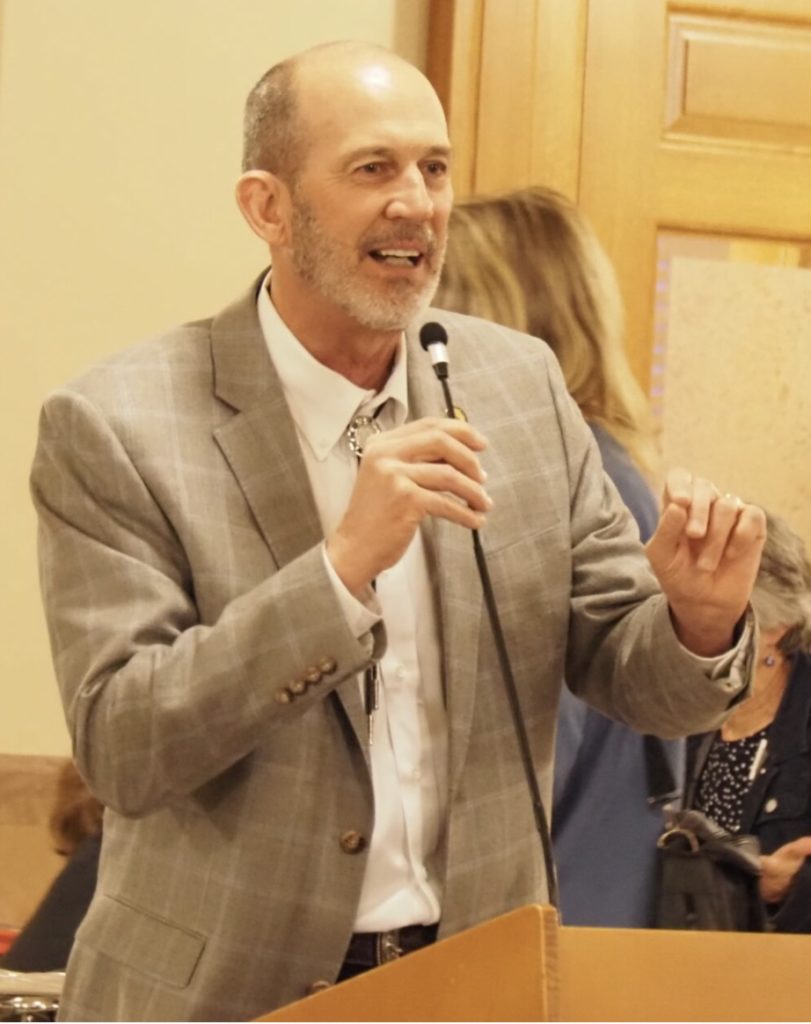Education professionals tell lawmakers what it will take to get third-graders reading at grade level
By Lauren Tice Miller and Angela Deines
What does it take to get Kansas third-graders reading at grade level? It takes a significant investment of financial and professional development resources, a group of educational professionals told the Kansas House K-12 Education Budget Committee this week.
Raising third-grade reading achievement is an initiative that has been identified as a common goal to work on in partnership between the Kansas State Board of Education and the Kansas Legislature.
The K-12 budget committee, chaired by Rep. Kristey Williams, R-Augusta, heard solid testimony from a group of individuals with a variety of experiences in the field of English-Language Arts, reading, and literacy — ranging from those in the field working directly with students to administrators.
First, they identified the need for a robust social/emotional learning (SEL) curriculum, citing a meta-analysis of 213 studies that showed high quality SEL programming yields higher academic achievement. It was also highlighted that for every $1 invested in SEL programming, there is a return on investment of $11 because the programming greatly reduces the need for additional interventions, remediation, program recovery, etc.
These educational professionals outlined the following five components needed to reach their goal of increasing third-grade reading achievement:
– Knowledgeable teachers and administrators
– Meaningful assessments
– Multi-tiered framework
– High quality instructional materials
– PreK-16 collaborative efforts
Their testimony also underscored the need for equitable and adequate school funding “for these components to be structured, implemented, scaled, and sustained over time with fidelity.”
Despite the clarity of these education experts of what is needed from the legislature to achieve the shared goal, Rep. Williams took a moment following their testimony to clarify that what she’s specifically looking for and that is “how we can specifically support you,” she said. She went on to point out that she wants specifics on how districts are going to meet the needs of those students who are not currently proficient, giving examples of after school programs, summer school programs, and so on. In other words, programs and interventions that still require funding and knowledgeable teachers to operate. Sadly, the great testimony seemed to fall on deaf ears.
Since this is a joint goal between the legislature and the state board of education, this topic will come up, again, during session. We will be monitoring this closely to see whether this committee will actually take these educators’ suggestions seriously and make recommendations of significant investments in raising third-grade reading levels to the legislature.
Accreditation and the Sub Shortage
Also this week, Rep. Williams’ committee heard presentations from the Kansas State Department of Education (KSDE) on accreditation and the substitute teacher shortage.
Rep. Susan Estes, R-Wichita, questioned KSDE officials as to why accreditation wasn’t determined by individual buildings within a district. Citing data from her home district, she contended that KSDE should factor in the proficiency rates of each building when determining accreditation rather than providing a “blanket” accreditation for the entire district.
Rep. Williams criticized the accreditation process, claiming KSDE does not take academic achievement or improvement of outcomes into consideration when determining accreditation. She went on to say that if these elements are there, they’re just not visible – setting the stage for a transparency argument.
KSDE defended the process, saying that achievement and school improvement are at the foundation of the accreditation process.
The committee also heard an update on the substitute teacher shortage. Although there are 14,067 active sub licenses, there are still not enough because of the increase in absences related to the most recent outbreak of COVID cases across the state.
Rep. Williams ended the meeting by publicly responding to media requests about schools’ inability to shift to remote learning due to the 40-hour limitation passed last year by the legislature. Williams argued districts have more flexibility now than they did before the pandemic. In her mind, that may be the case. However, it’s not that simple.
As we outlined in our statement last week, if a district moves a school building or the entire district to remote learning, the law passed in 2021 caps the amount of time to 40-hours per student per school term. If the 40-hour limitation is exceeded, districts are penalized by a reduction in funding to a flat rate of $5,000 per student, which is the same rate as a student attending a virtual school.
Coming up next week…
While the House Education Committee met briefly on Thursday, their short meeting provided quite a window into what is on the education horizon.
Rep. Jerry Stogsdill, D-Prairie Village, ranking minority member on the committee, announced that next week he will introduce a bill to restore due process rights to “every teacher in Kansas” that were taken away in 2014.
“I think it’s the only thing that’s just to do at this point after all we’ve asked our teachers to do over the last two years,” he said.
Several education-related bills that were either vetoed by Gov. Laura Kelly or never made it to her desk during the 2021 session are expected to be resurrected this session and reintroduced in committee very soon. Those include making personal and financial literacy a high school graduation requirement, not allowing transgender girls to play women’s high school sports, providing additional professional liability insurance for educators and allowing the administering of emergency medications – known as the “EpiPen” bill, to name a few.
Rep. Adam Thomas, R-Olathe, vice chair of the House Education Committee, said there isn’t a specific timeline to reintroduce the above-mentioned bills. He said none of the bills are “off the table” and “there is some intent to bring some of those bills back to work in committee.”
There are also hearings scheduled on several bills in both the House and the Senate, including one that dictates every high school offer at least one computer science course and establishes a graduation requirement of one credit in computer science.
In addition, Rep. Williams is hosting a series of panels next week: The first is on Monday, Jan. 24, discussing Critical Race Theory, though she has decided to call it “Critical Pedagogy.” On Tuesday, Jan. 25, there will be a briefing on Social Emotional Learning (SEL) followed by a briefing on credit recovery for students on Wednesday, Jan. 26. Don’t be surprised if these briefings bring new bill introductions along with them. Stay tuned…
KDHE to cease contact tracing, including in schools; Anti-vax resolution includes children
Janet Stanek, acting secretary of the Kansas Department of Health and Environment, told the Senate Public Health and Welfare Committee this week that her agency will stop COVID contact tracing at the end of January. She said the predominance of the Omicron variant and the public’s growing unwillingness to identify close contacts prompted her agency to take this action.
Stanek said KDHE is asking people who test positive for COVID-19 to let their close contacts know of their positive test. She said schools haven’t been able to keep up with contract tracing given the prevalence of COVID-19 among students and staff so not continuing the practice is expected to “relieve one more stresser” for the schools. The decision to cease contact tracing is expected to be revisited in a few weeks.
In the meantime, Sen. Mark Steffen, R-Hutchinson, has introduced a non-binding resolution that declares, “Without reproducible, long-term data about the safety of these vaccines, the risks to the long-term health of children remain too high to support COVID-19 vaccines and vaccine mandates for healthy children.” The resolution also states children are at risk for permanent heart, brain, reproductive and immune system damage if they are vaccinated against COVID-19.
Introduced recently in the Senate Public Health and Welfare Committee, the resolution also declares that “natural immunity is the best long-lasting solution against the development of COVID-19 disease and its more serious outcomes.” Faced with the potential that thousands of unvaccinated Kansas children would be allowed to attend public school, we will be keeping a close eye on the progress of this resolution.
As a reminder, this same committee passed Senate Bill 212, the bill that makes significant changes to requirements of childhood vaccinations. It’s awaiting full action by the Senate.





